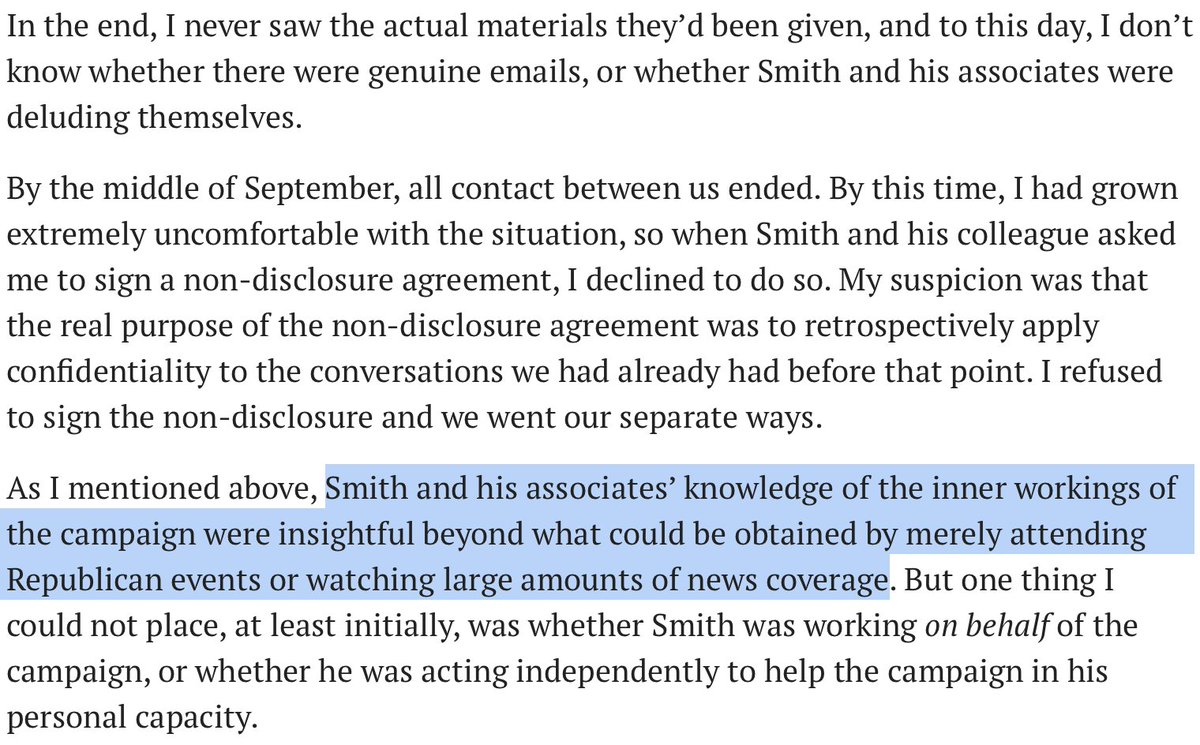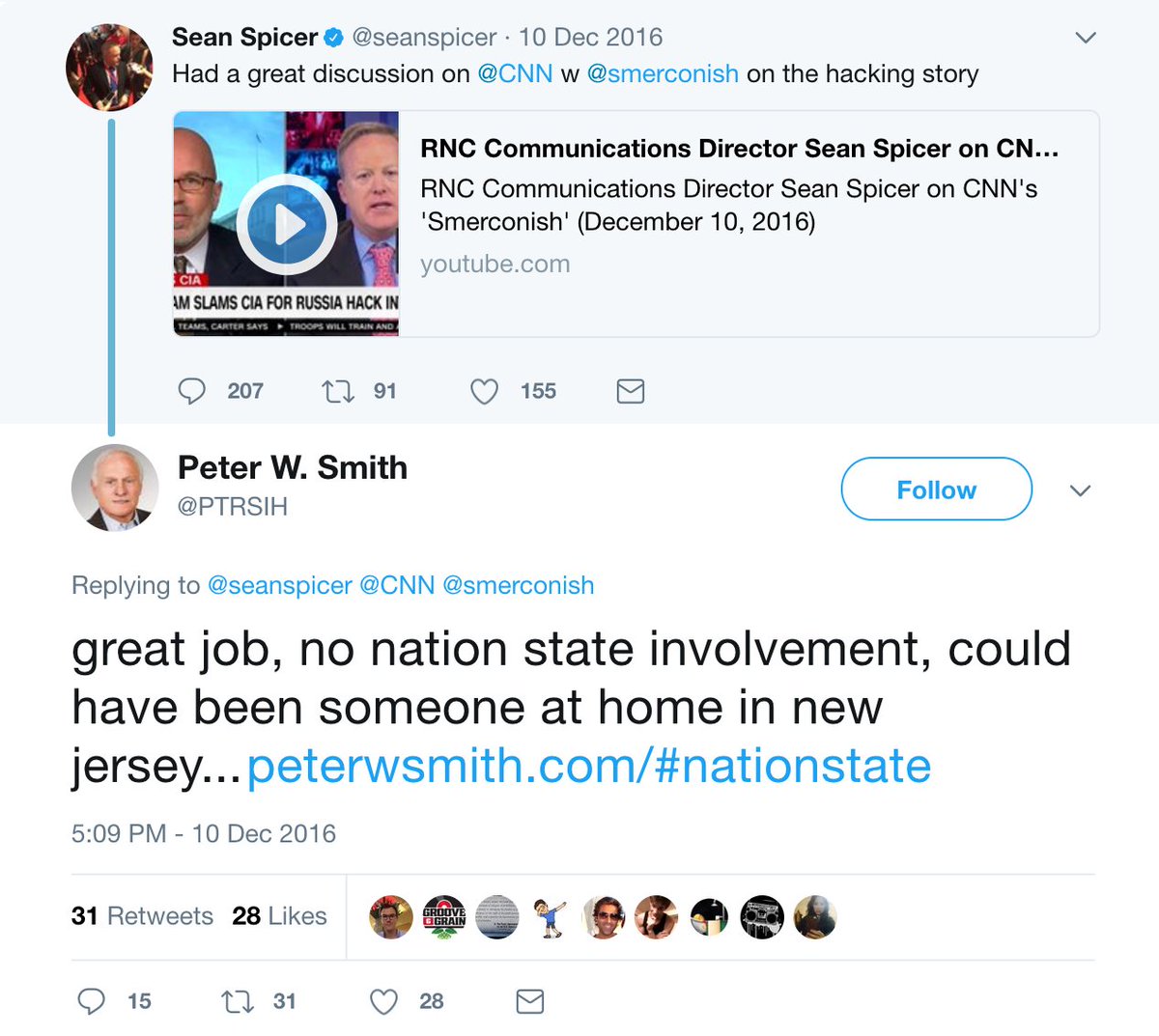Hey, everyone! Bored to tears, I wrote a quick summary of the
WSJ and Lawfare articles. Some of you may go, "Who cares?" but it might help someone who wants to be apprised of the situation more quickly:
1. Peter Smith, a veteran Republican operative, assumes that Hillary's deleted emails have been obtained by hackers. Aware that releasing them could damage her campaign, he resolves to find them, assembles a team, and establishes a Delaware LLC called KLS Research (relevant later).
2. He and his team scour the internet, eventually arriving at the Dark Web, where several groups of hackers, some perhaps affiliated with the Russian government, claim to have the emails. Smith's team has no way to prove their veracity.
3. Smith enlists Matt Tait (aka @pwnallthethings), formerly of British GCHQ and a security analyst. Tait has previously commented on the DNC/Podesta hacks and assumes that Smith merely wants a consultation. After all, if Russia can hack the Democrats, they can hack the Republicans!
4. Smith tells Tait about his quest to find the emails, as well as about his questionable sources on the Dark Web. Tait, who never communicates with the source, grows increasingly uneasy, believing that Smith may have gotten involved with a genuine Russian hacking outfit. Smith seems nonchalant about the possibility of being involved with the Russians. Tait nopes the fuck out, for lack of a more elegant term, but before he goes, he sees a few documents and makes few observations...
5. Tait receives and keeps a recruitment document titled "A Demonstrative Pedagogical Summary to be Developed and Released Prior to November 8, 2016," dated September 7. (Some research indicates that KLS Research, Smith's LLC, was established
on September 2.) One section of this document lists members of Trump's campaign - among them Steve Bannon, Kellyanne Conway, and Michael Flynn - as being involved with Smith's efforts. The aforementioned claim not to know Smith, not to have spoken with him in years, or just give no comment, respectively. This section bears the heading "Trump Campaign (in coordination to the extent permitted as an independent expenditure)." Tait reasons that Smith might just be a "name-dropper." After all, Tait's own name appears in the document, and he's had almost naught to do with Smith's mission.
6. The June 29
WSJ article, however, contains the following passage:
The operation Mr. Smith [who died on May 14, soon after his interview with the WSJ] described is consistent with information that has been examined by U.S. investigators probing Russian interference in the elections.
Those investigators have examined reports from intelligence agencies that describe Russian hackers discussing how to obtain emails from Mrs. Clinton's server and then transmit them to Mr. Flynn via an intermediary, according to U.S. officials with knowledge of the intelligence.
Though the
WSJ cautions that this intermediary's identity has not been uncovered, the late Mr. Smith seems a likely candidate. Indeed, Eric York, who worked with Smith to find the emails, recalls Smith's saying, "I'm talking to Michael Flynn about this—if you find anything, can you let me know?" Emails exchanged among Smith's team further suggest an association with Flynn, Flynn's son, and Flynn's consulting company. A LinkedIn page supposedly listing the members of Smith's team also lists Flynn's company. Additionally, Tait, the "unnamed computer expert" in the June 29 article and on record in the June 30 article, recounts conversations in which Smith mentions his association with Flynn. Trump and co. never deny Flynn's involvement but say that Flynn may have worked with Smith as a "private individual," not on behalf of the campaign. If you'll recall, however, Smith's document lists Flynn under the "Trump campaign" section.
7. In his article, Tait draws some chilling conclusions:
My perception then was that the inclusion of Trump campaign officials on this document was not merely a name-dropping exercise. This document was about establishing a company to conduct opposition research on behalf of the campaign, but operating at a distance so as to avoid campaign reporting. Indeed, the document says as much in black and white.
The combination of Smith's deep knowledge of the inner workings of the campaign, this document naming him in the "Trump campaign" group, and the multiple references to needing to avoid campaign reporting suggested to me that the group was formed with the blessing of the Trump campaign. In the Journal's story this evening, several of the individuals named in the document denied any connection to Smith, and it's certainly possible that he was a big name-dropper and never really represented anyone other than himself. If that's the case, Smith talked a very good game.
A narrative thus starts to take form: the Trump campaign join with Smith to "find" Hillary's deleted emails*, and they designate Flynn as the point of contact for this endeavor. Peter Smith, though intimately linked with the campaign and its members, establishes an "independent" corporation so he can claim distance and avoid campaign reporting laws. However, as we've seen, Smith's teammates and his own documentation contradict this claim. Smith and co. find a supposedly Russian source that claims to have the emails. If investigators can verify the link between Smith and Trump's campaign, we have collusion. (In fact, they may have already have verified as much; the public learns about these matters well after the fact.)
In the above summary, I've tried to include only the facts and the "reasonable inferences" the articles would have a reader draw. (They can't say everything directly, so they often hint heavily and lead us to the conclusions.) If I've made a factual error or ventured too far into conjecture, be a darling and let me know so I can amend the post.
Now, for one of my own theories:
*the Russian source and the quest to get the emails: I think Smith and Trump's campaign knew they'd be getting emails from Russians. They concocted the "search" and the Dark Web story so they could have plausible deniability: "We didn't know they came from Russia!" Of course, this theory requires that the Russians successfully obtained the deleted emails in the first place. But then, they probably would've released them. Now you see why I avoid making my own theories.
Send me to Mensch if too loony; criticize my writing if prose proves too ungainly.
EDIT: Fixed some minor factual flaws.


